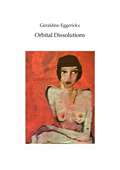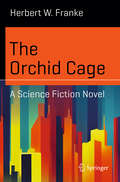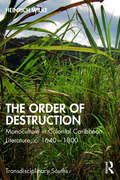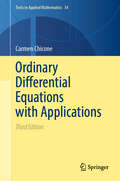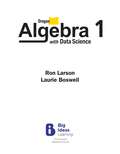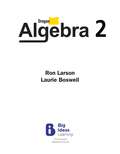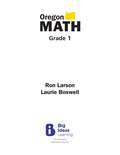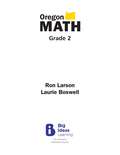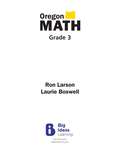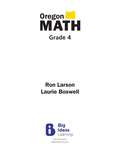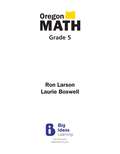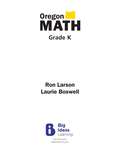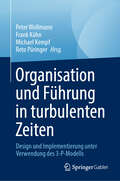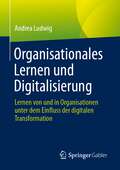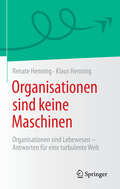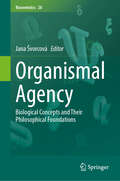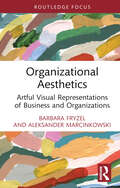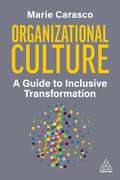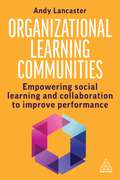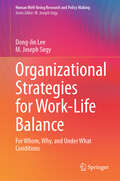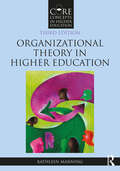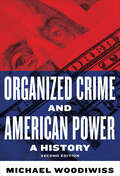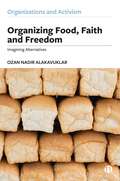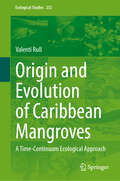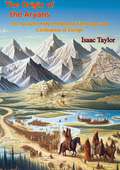- Table View
- List View
Orbital Dissolutions
by Géraldine EggerickxThree short stories that share a theme of introspective journeys through the inextricable twists and turns of the main characters.
The Orchid Cage: A Science Fiction Novel (Science and Fiction)
by Herbert W. FrankeThis book is a new English translation of the classic science fiction story written in 1961 by Herbert W. Franke, widely held to be the most important German-language science-fiction writer. A dead city on a distant planet, two groups of people trying to explore it. Step by step, they penetrate the outer ring with its ultra-modern technology, the half-ruined medieval city center and finally the mysterious center. But is the eerie city really dead? Suddenly the factories start working again, the automatons intervene, and somewhere in the background there is still something hidden that could perhaps awaken. But is it people or machines? Herbert W. Franke leads the reader into an oppressively strange world; only after the startling resolution does it become clear what lies behind the adventures of the intruders - not a cosmic strangeness, but a threatening development that could affect humans in the same way. Franke's novel is thus a parable of the evolution of all humans in the age of technical communication ...
The Order of Destruction: Monoculture in Colonial Caribbean Literature, c. 1640-1800 (Transdisciplinary Souths)
by Heinrich WilkeThis book studies sugarcane monoculture, the dominant form of cultivation in the colonial Caribbean, in the later 1600s and 1700s up to the Haitian Revolution. Researching travel literature, plantation manuals, Georgic poetry, letters, and political proclamations, this book interprets texts by Richard Ligon, Henry Drax, James Grainger, Janet Schaw, and Toussaint Louverture.As the first extended investigation into its topic, this book reads colonial Caribbean monoculture as the conjunction of racial capitalism and agrarian capitalism in the tropics. Its eco-Marxist perspective highlights the dual exploitation of the soil and of enslaved agricultural producers under the plantation regime, thereby extending Marxist analysis to the early colonial Caribbean. By focusing on textual form (in literary and non-literary texts alike), this study discloses the bearing of monoculture on contemporary writers’ thoughts. In the process, it emphasizes the significance of a literary tradition that, despite its ideological importance, is frequently neglected in (postcolonial) literary studies and the environmental humanities.Located at a crossroads of disciplines and perspectives, this study will be of interest to literary/cultural critics and historians working in the early Americas and in Atlantic studies, to students and scholars of agriculture, colonialism, and (racial) capitalism, to Marxists and postcolonial critics, and to those working in the environmental humanities and in Global South studies.
Ordinary Differential Equations with Applications (Texts in Applied Mathematics #34)
by Carmen ChiconeThis book, developed during 20 years of the author teaching differential equations courses at his home university, is designed to serve as a text for a graduate level course focused on the central theory of the subject with attention paid to applications and connections to other advanced topics in mathematics. Core theory includes local existence and uniqueness, the phase plane, Poincaré-Bendixson theory, Lyapunov and linearized stability, linear systems, Floquet theory, the Grobman–Hartman theorem, persistence of rest points and periodic orbits, the stable and center manifold theorems, and bifurcation theory. This edition includes expanded treatment of deterministic chaos, perturbation theory for periodic solutions, boundary value problems, optimization, and a wide range of their applications. In addition, it contains a formulation and new proof of a theorem on instability of rest points in the presence of an eigenvalue with positive real part, and new proofs of differential inequalities and Lyapunov’s center theorem. New sections present discussions of global bifurcation, the Crandall–Rabinowitz theorem, and Alekseev’s formula. Of particular note is a new chapter on basic control theory, a discussion of optimal control, and a proof of a useful special case of the maximum principle. A key feature of earlier editions, a wide selection of original exercises, is respected in this edition with the inclusion of a wealth of new exercises. Reviews of the first edition:“As an applied mathematics text on linear and nonlinear equations, the book by Chicone is written with stimulating enthusiasm. It will certainly appeal to many students and researchers.”—F. Verhulst, SIAM Review “The author writes lucidly and in an engaging conversational style. His book is wide-ranging in its subject matter, thorough in its presentation, and written at a generally high level of generality, detail, and rigor.”—D. S. Shafer, Mathematical Reviews
Oregon 2024 Algebra 1 with Data Science
by Ron Larson & Laurie BoswellOregon 2024 Algebra 1 with Data Science
Organisation und Führung in turbulenten Zeiten: Entwurf und Implementierung unter Verwendung des 3-P-Modells
by Peter Wollmann Frank Kühn Michael Kempf Reto PüringerDieses Buch knüpft an die erfolgreiche Entwicklung des Drei-Säulen-Modells (3-P-Modell) der Autoren für die Organisation und Führung in disruptiven Zeiten an. Der Schwerpunkt liegt darauf, dem Leser bei der Umsetzung des Modells zu helfen und eine Vielzahl von Anwendungsfällen für diese VUCA-Zeiten (Volatilität, Ungewissheit, Komplexität und Mehrdeutigkeit), einschließlich globaler Krisen wie der COVID-19-Pandemie, zu liefern. Das Buch deckt ein breites Spektrum von Organisationen ab: privater und öffentlicher Sektor, Nichtregierungsorganisationen, lokale und globale Regierungsinstitutionen, globale Organisationen wie die UNO usw. Darüber hinaus wird aufgezeigt, wie das 3-P-Modell auf Herausforderungen bei der Organisationsgestaltung, dem Management und der Führung angewendet werden kann.
Organisationales Lernen und Digitalisierung: Lernen von und in Organisationen unter dem Einfluss der digitalen Transformation
by Andrea LudwigDas Buch zeigt anhand aktueller Forschungsthemen und Praxisbeispiele, welche Veränderungen die digitale Transformation in den Lernprozessen von und in Organisationen ausgelöst hat. Anpassungen von Organisationen auf Veränderungen sind die Basis für Innovationsprozesse, die wiederum auf den Ergebnissen der individuellen Lernprozesse der Mitarbeiter*innen und einem fluiden Wissensmanagement in den Organisationen aufbauen. Innovative digitale Lernformen und -formate, digitale Kollaborationstools und ein fließendes Wissensmanagement sind Voraussetzung für eine lernende Organisation und damit für ein gelingendes Change Management. Nach einer kurzen Einführung in die Thematik der digitalen Transformation und den Herausforderungen für Organisationen fokussiert sich die Autorin auf das organisationale Lernen, erforderliche Grundbausteine in Bezug auf das digitale und selbstgesteuerte Lernen sowie verschiedene Ausprägungen von digitalen Lernangeboten. Dabei werden neue digitale Lernformen und -strukturen auch unter dem Einfluss von KI aufgezeigt und mit Praxisbeispielen sowie aktuellen Forschungsergebnissen angereichert. Anschließend beleuchtet die Autorin das organisationale Wissensmanagement und dessen rasante Weiterentwicklung in den letzten Jahren.
Organisationen sind keine Maschinen: Organisationen sind Lebewesen - Antworten für eine turbulente Welt
by Klaus Henning Renate HenningWachsende Komplexität und Dynamik prägt diese Welt und auch die meisten Organisationen. Die damit verbundene zunehmende Turbulenz besser zu verstehen und zu meistern ist Anliegen dieses Buches. Es zeigt, dass Organisationen keine Maschinen sind, sondern als Lebewesen verstanden und gesteuert werden sollten. Die Autoren beschreiben, wie diese systemische Denkweise seit Mitte der 1940er Jahre in vielen Disziplinen zu finden ist und als kybernetischer Ansatz vernetzt ist mit den biologischen, soziologischen, psychologischen, technischen und chaostheoretischen Ansätzen. Schon das erste Mal, als wir Mitte der 80iger Jahre mit dem OSTO-Ansatz in Berührung kamen, hat es uns gepackt. Von nun an begannen wir Organisationen als Lebewesen, als soziologische Einheit, zu sehen und nicht als statisches, militaristisches Gebilde. Damals war das für uns etwas völlig Neues. Die Organisation als ein Lebewesen, dass sich verändern kann und nicht stehen bleiben muss in vorgegebenen Mustern zu betrachten, das ist eine Chance für Menschen in Organisationen, die in der immer turbulenter werdenden Welt zurecht zu kommen wollen und müssen.Die Auseinandersetzung mit den komplexen Zusammenhängen der jeweiligen Zeit waren für uns immer schon von großem Interesse. Während Klaus Henning Elektrotechnik studierte und Renate Henning Pädagogik besuchten wir in unserer Münchener Studienzeit beide die Hochschule für Politische Wissenschaften in München. Diese Kombination prägt unser Denken und Handeln bis heute.
Organismal Agency: Biological Concepts and Their Philosophical Foundations (Biosemiotics #28)
by Jana ŠvorcováThis book explores the notion of organismal agency from the perspective of both philosophy and biology. The two sections of the book delve into parallel themes, including distinctions between organic and inorganic nature, self-organization, autonomy, self-presentation, memory, umwelt, and environmental influence. The philosophical part focuses on the influential thinkers who shaped our perception of living entities beyond mere mechanisms. It scrutinizes the concepts of organism and nature in the works of Aristotle, Kant, Schelling, and various processualists. Each chapter explores facets of their ideas that directly or indirectly foreshadowed or contributed to the formulation of the concept of agency. The biological part of the book investigates various concepts associated with agency such as experience, meaning attribution, and phenotypic plasticity, as well as reproduction, organisational constraints, modularity, development of integrated phenotypes, organismal choices, or self-representation through animal organisation. In essence, this work offers a comprehensive examination of organismal agency and its philosophical and biological foundations. Collaboratively authored by individuals from several institutions, this publication caters primarily to researchers and students working at the intersection of philosophy and biology.
Organizational Aesthetics: Artful Visual Representations of Business and Organizations (ISSN)
by Barbara Fryzel Aleksander MarcinkowskiOrganizational Aesthetics attempts to reconstruct artful representations of the organizational world and businesspeople. It looks at organizations and management through the eyes of artists, painters, and photographers and decodes meanings contained in artistic messages, grasping the aesthetic perceptions of the world of management and organization. Paintings and photos are analysed using qualitative methods from the social sciences as well as from the art analysis tradition. The novelty of the presented approach rests in the original method of parallel dialogues, taking place both in the institutional sphere and between co-authors. The institutional aspect covers a practical, business perspective and extends the narrow framework of a single discipline. It complements academic rigour with elements of digression and free conversation, revealing a variety of nuances for which conventional research paradigms do not always allow. Readers will receive a proposal on how to integrate diff erent approaches to organizational analysis stemming from artistic, managerial, and academic experiences.
Organizational Culture: A Guide to Inclusive Transformation
by Marie CarascoDiscover how to transform company culture by embracing the interconnectedness of business and social interests to promote an inclusive workplace.Organizational Culture offers a comprehensive roadmap for transforming company culture. Using a strategic framework for navigating change, this essential guide provides business leaders and change catalysts with a holistic strategy for building a dynamic and inclusive culture. It highlights the importance of leveraging psychological principles, interpersonal dynamics, employee interest-driven initiatives and cooperative leadership to create lasting change. Featuring case studies for practical insight into how to cultivate trust and employee engagement, Organizational Culture highlights how these steps can help align Diversity, Equity, Inclusion and Belonging (DEIB) initiatives to support culture transformation. The resulting resource breaks down the best ways organizations can start engaging in inclusive culture change.
Organizational Learning Communities: Empowering Social Learning and Collaboration to Improve Performance
by Andy LancasterLearning communities transform organizations through sharing knowledge, spearheading practice, solving problems, seeding innovation and supercharging development. So how can you develop a culture of learning in your organization? Organizational Learning Communities answers this question and explains how and why this approach can improve individual employee performance and drive overall business results. Written by a leading voice in the learning profession, this book contains everything that Learning and Development (L&D) practitioners need to know to successfully embed learning communities in their organizations. Following the 7Cs model of Cause, Culture, Conditions, Cadence, Content, Contributions and Credit, the book establishes the key factors that underpin thriving learning communities as well as the benefits of social and collaborative learning in the company. This practical guide establishes strategies to drive community impact and report success to stakeholders, drawing widely on evidence-based research and real-world examples. Each chapter ends with reflective questions to support transfer to the reader's context. This is essential reading for those involved in facilitating learning communities, or planning on pioneering one, to empower their organization's productivity and performance.
Organizational Strategies for Work-Life Balance: For Whom, Why, and Under What Conditions (Human Well-Being Research and Policy Making)
by M. Joseph Sirgy Dong-Jin LeeThis book provides a systematic review of the research literature related to the effectiveness of organizational policies and programs on work-life balance (WLB). It discusses policies and practices related to workload management, flextime, flexplace, alternative job arrangements, and family care. Based on the evidence, the authors make specific recommendations to organizational executives and HR directors to design and implement work-life balance policies and programs to maximize their effectiveness and help employees achieve their optimal level of work-life balance. Specifically, the authors discuss how to: (1) identify employees with greater need for WLB programs, (2) evaluate environmental circumstances for WLB programs (3) design effective WLB policies and programs, (3) facilitate effective implementation of WLB policies and programs, (4) provide management support for WLB policies and programs, and (5) evaluate performance of WLB policies and programs. Written lucidly by experts in the field and with many case studies and examples, this book appeals to a wide range of academic and professional readers.
Organizational Theory in Higher Education (Core Concepts in Higher Education)
by Kathleen ManningThe third edition of Organizational Theory in Higher Education is a comprehensive and accessible treatment of organizational theory and higher education administration. Through her presentation of both traditional and contemporary organizational theories, noted scholar Kathleen Manning offers a multi-faceted take on the models and lenses through which higher education can be viewed.Chapters discuss the disciplinary foundation, uses, constructs, and assumptions of each organizational theory, including theories often excluded from the literature like organized anarchy, feminist, loosely coupled systems, and queer theory. Each chapter concludes with a case study and discussion questions that encourage the reader to make connections to their practice. Combining theory and practice, Manning’s rich, interdisciplinary treatment enables leaders to gain a fuller understanding of the perspectives that operate on college campuses and ways to enact inclusive, ethical change in the context of new and continuing challenges.New to this Edition: A new chapter on Queer Theory that presents more socially just approaches to institutional organization A new chapter on Loosely Coupled Systems presenting the application of this theory to higher education settings Revised chapters, updated theory, and new coverage that reflect current issues, such as pandemic, crisis responses, and social media Several new and revised case studies to address contemporary issues and align with current realities of higher education Updated and enhanced discussion questions to continue the conversation
Organized Crime and American Power: A History, Second Edition
by Michael WoodiwissPopular histories of organized crime in the United States often look to the Mafia and the sons of early twentieth-century immigrants – such as Al Capone, Lucky Luciano, and Meyer Lansky – for their origins. In this second edition of Organized Crime and American Power, Michael Woodiwiss refocuses on US organized crime as an American problem. The book starts in 1789, with the birth of a new nation, intended to be run according to laws and conventions, with a written commitment to civil rights. Woodiwiss examines the organization of crime before the Civil War, which damaged or destroyed the lives of those excluded from constitutional protections: Indigenous peoples, Black people, and women. The book focuses on white supremacist crime and the pernicious influence of Southern leaders in alliance with opportunistic politicians. It examines the organized crimes of powerful business interests in alliance with politicians, as well as the corrupt consequences of the US moralistic campaigns against alcohol, gambling, drugs, and abortion. Organized Crime and American Power brings solid historical evidence and analysis to the task of refuting conventional wisdom that frames organized crime as something external to US political, economic, and social systems.
Organizing Food, Faith and Freedom: Imagining Alternatives (Organizations and Activism)
by Ozan Nadir AlakavuklarConsumerism, unsustainable growth, waste and inequalities continue to ail societies across the globe, but creative collectives have been tackling these issues at a grassroots level. Based on an autoethnographic study about a free food store in Aotearoa New Zealand, this book presents a first-hand account of how a community is organized around surplus food to deal with food poverty, while also helping the reader to see through the complexity that brings the free food store to life. Examining how alternative economies and relations emerge from these community solutions, the author shows it is possible to think, act and organize differently within and beyond capitalist dynamics.
Origin and Evolution of Caribbean Mangroves: A Time-Continuum Ecological Approach (Ecological Studies #252)
by Valentí RullThis book provides a comprehensive, detailed, and coherent spatio-temporal account of Caribbean mangrove evolution from its evolutionary origins to the present that is not available for any mangrove region in the world. Mangroves are intertidal wetland forests that play a crucial role in the maintenance of terrestrial and marine biodiversity, and in the functioning of global biogeochemical cycles (especially the carbon cycle). These ecosystems dominate the tropical/subtropical coasts of all continents and are among the most threatened ecosystems in the world. This book combines all temporal scales, from the geological to the ecological, to provide an integrated picture of mangrove history and the natural and anthropogenic drivers of ecological and evolutionary change. This may be useful not only for understanding the current ecological status of these emblematic ecosystems, but also for informing their conservation in the face of ongoing global change.
The Origin of the Aryans. An Account of the Prehistoric Ethnology and Civilisation of Europe
by Isaac TaylorEmbark on an enlightening exploration of ancient Europe with Isaac Taylor's The Origin of the Aryans: An Account of the Prehistoric Ethnology and Civilization of Europe. This seminal work offers a comprehensive and scholarly examination of the origins, migrations, and cultural development of the Aryan peoples, whose influence has profoundly shaped the history and civilization of Europe.Taylor, a distinguished philologist and ethnologist, meticulously pieces together the puzzle of Aryan prehistory through a synthesis of linguistic, archaeological, and anthropological evidence. His rigorous analysis traces the roots of the Aryan peoples, delving into their early habitats, societal structures, and the extensive migrations that spread their language and cultural practices across the European continent.The Origin of the Aryans provides readers with an in-depth understanding of the various theories and debates surrounding Aryan origins. Taylor critically examines the evidence for the Proto-Indo-European homeland, offering insights into the linguistic connections and cultural exchanges that link the diverse Aryan-descended populations.In addition to tracing the migratory paths and settlements of the Aryans, Taylor explores their contributions to the prehistoric civilization of Europe. He sheds light on the advancements in agriculture, metallurgy, social organization, and religious practices that the Aryans introduced, which laid the foundations for later European societies.The Origin of the Aryans invites readers to delve into the distant past and discover the intricate web of influences that shaped the prehistoric ethnology and civilization of Europe. Isaac Taylor's work remains a cornerstone in the study of ancient European history and the enduring legacy of the Aryan peoples.
